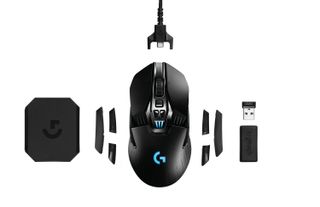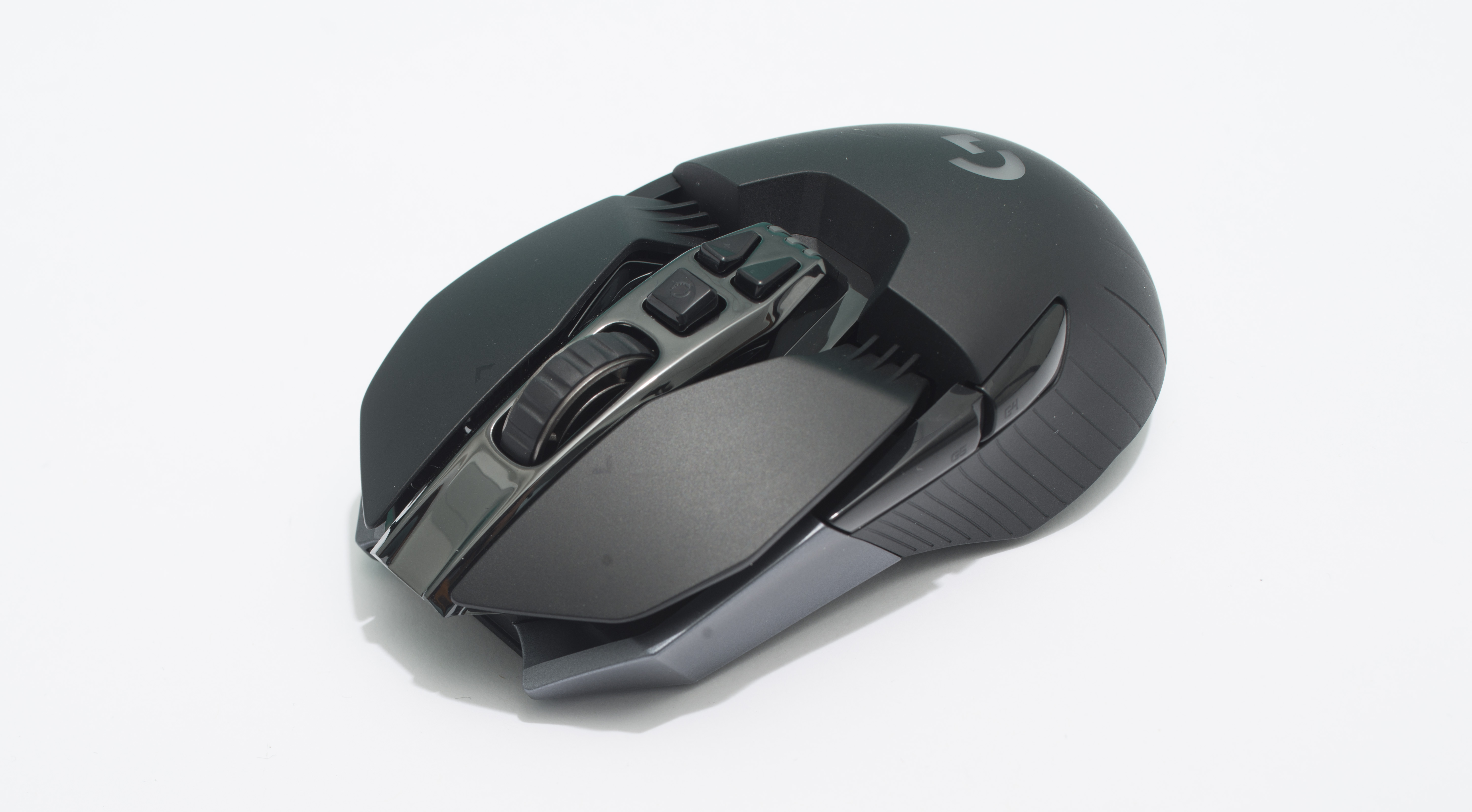Our Verdict
An expensive gaming mouse, but its features and wireless performance justify the price.
PC Gamer's got your back
After more than a month of using the Logitech G900 as my daily work and gaming mouse, I can’t find a single flaw or thing to dislike about Logitech’s new wireless flagship. It’s incredibly light for a wireless mouse (and light for a gaming mouse, period, at 107 grams), has a fantastic shape that contours to my hand despite being an ambidextrous design, and hasn’t shown a single sign of jitter, stutter, or wireless failure in the time I’ve been testing it. It’s the best gaming mouse I’ve ever used, with only one drawback: to accomplish the feat of engineering that is the G900, Logitech made a $150 mouse, double or triple the price of the best wired mice that exist today.
Setting aside the value conversation for a minute, the G900 is a feature-packed mouse that would be ambitious even before you factor in the complexities of wireless gaming. The 107 gram weight is targeted at players who, like pro gamers, want a light mouse to operate as an extension of their hand, not a heavy object that you sling across a pad. Despite that weight, the G900 doesn’t feel fragile or cheap. There’s no flex in the plastic if you squeeze it.
Logitech’s signature metal Hyper scroll wheel is still there, now cored out to weigh a few grams less. The wheel still spins freely for 15 seconds or delivers a satisfying notched scroll depending on the mode you have it set to with a quick button press. The wheel also clicks side-to-side for two more button inputs, one of my favorite features of past Logitech mice. I don’t use it for gaming, but I love it as a web browser forward-and-back keybind.
The two real stars of the G900 are its ambidextrous body and its newly designed hinge for the left- and right-click buttons. Ambidextrous designs usually result in a shape that’s not as ideal for a right-handed grip. As a lefty myself, I’m sympathetic to gamers who want a great mouse designed for their left hand, but as I grew up under the vicious thumb of the public education system, I long ago learned to use a mouse (and scissions) with my right hand. While there are ambidextrous shapes out there that many players swear by (often because they’re small, lightweight mice) like the Steelseries Sensei, I often find myself mis-clicking the buttons on the right side of the mouse, or wishing my thumb and pinky had unique grooves or grips designed to support them.
Those issues don’t crop up with the G900. A pair of thumb buttons on each side of the mouse can easily be removed or attached using magnets, and the G900 ships with blank pieces to fill in the button slots for your off hand. Despite attaching with magnets, I haven’t had any problem with the click activation of the buttons or their ability to stay attached to the mouse. Their size and placement is also a welcome improvement over Logitech’s last model, the G303, which made its thumb buttons a bit too small and thin.

The thumb grooves on each side of the mouse are excellently contoured (and have some light grooves for added grip) to give my thumb and pinky purchase. The easiest way to describe the holding the G900 is to say that it doesn’t feel like an ambidextrous mouse in my hand. The back hump of the mouse is ideal for either a palm or claw grip, and while the harsh angles on top look like they’d pinch your hand, I’ve never made contact with those spots in a month of use.
Logitech’s new pivot bar for its main mouse buttons creates the best feeling and sounding click I’ve ever used in a mouse. Sound definitely plays a subtle part in the “feel” of a click, in the same way that a car’s exhaust affects how we perceive its power (Ford actually engineered the 2008 Mustang to sound like it did on-screen in Steve McQueen’s Bullitt). The practical benefit to this design is that the click behaves consistently no matter where you click on the button. Because the click action comes from a metal pivot bar, not a piece of plastic flexing on a hinge point, there’s no variance in the way the plastic moves based on where your finger presses the button.
This is the kind of minutia that most of us will never notice or care about while we’re playing games, and the vast majority of the time, maybe it doesn’t matter. But it feels great. It feels crisp. I could use all kinds of other adjectives that would also apply to a fresh cucumber. The practical benefit is that no matter how fast I’ve tried to click with the G900, I’ve never had the button rebound with my finger and cause me to miss a click. It is the absolute polar opposite of the click in the worst gaming mouse I’ve ever used.
In my testing of the G900’s sensor (the same featured in Logitech’s G502 and the G303), I couldn’t detect any issues with acceleration or jitter, even at a high DPI setting of 8000. The mouse responds to tiny movements but doesn’t pick up microscopic readings from cloth mousepads the way some laser sensors do. And since there’s no cord when using the mouse wirelessly, its lightweight body can’t get jerked around by its cable.
I’ve already written about how Logitech designed the G900 and its 12,000 DPI sensor for wireless performance, and testing it with games like League of Legends and Unreal Tournament hasn’t revealed any issues for me in terms of performance. It simply feels great. Clicks are responsive. There’s no perceptible lag or stutter at the mouse’s 1 ms polling rate. This is anecdotal, but I landed a pretty sick headshot in Unreal Tournament. I recommend the feeling.
The G900’s battery life has been fantastic in the time I’ve used it. The mouse smartly goes to sleep after a short span of inactivity, but I’ve never experienced a perceptible bit of lag as I’ve woken it from sleep. It snaps to life and is ready to go. With its main LED disabled (a quick change in Logitech’s software), the mouse can operate continuously for a bit more than 30 hours. Sitting on my desk at work, I’ve charged the G900 about once per week.
If I designed the G900, there are tiny things I’d change. I’d likely add rubber thumb grips, a la the Razer Deathadder, to each side. Actually, that might be the only thing I’d change. The body design of the G900 is a step forward for Logitech, and its click mechanism and wireless performance are a step up for gaming mice, period. Those things add up to a mouse that’s worth $150, but a bit too expensive for the average gamer. If and when the price comes down, it’ll be the best gaming mouse, period.
An expensive gaming mouse, but its features and wireless performance justify the price.

Wes has been covering games and hardware for more than 10 years, first at tech sites like The Wirecutter and Tested before joining the PC Gamer team in 2014. Wes plays a little bit of everything, but he'll always jump at the chance to cover emulation and Japanese games.
When he's not obsessively optimizing and re-optimizing a tangle of conveyor belts in Satisfactory (it's really becoming a problem), he's probably playing a 20-year-old Final Fantasy or some opaque ASCII roguelike. With a focus on writing and editing features, he seeks out personal stories and in-depth histories from the corners of PC gaming and its niche communities. 50% pizza by volume (deep dish, to be specific).
